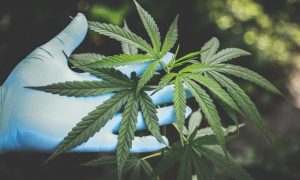In many new cases in the media, we are seeing veterinarians and emergency room doctors counting their arising weekly intakes of overdoses on cannabis infused edibles. In each story they say, “There’s nothing that can be done.” We are here to let you know that this is not true, something absolutely can be done. Cannabidiol (CBD) is a known tetrahydrocannabinol (THC) inhibitor, which means that a CBD dose can be administered to any patient or any that is feeling “too high.” No matter where you stand or how you feel about the cannabis plant, the medical research shows definite evidence of THC metabolizing at a different rate when cannabidiol was administered.
In 1996 a study was conducted by the Department of Pharmacy, at the University of California, San Francisco determining that cannabidiol inhibited the metabolization of tetrahydrocannabinol and cyclosporine (an immunosuppressive drug used to prevent the rejection of grafts and transplants), in mouse and human microsomes. The study found that cannabidiol selectively decreased THC levels in human cells, specifically the group of metabolizing enzymes in the human liver. Another study was conducted early last year in January of 2013 that found CBD inhibited paranoid and psychotic symptoms in human test subjects when administered prior to dosing intravenous THC.
The Beckley Foundation also conducted a study on a female human. In this two day study, on one occasion, she was given a mixture of intravenous THC + CBD and on the other day she was administered pure THC. With the CBD mix she was euphoric, coherent and happy. In contrast with the pure THC, she was paranoid, couldn’t form thoughts, couldn’t remember things, and was extremely mentally uncomfortable with how she was feeling.
THC is the psychoactive compound that makes you feel “high” and sometimes too high if ingested in concentrated forms. Cannabidiol (CBD) is the answer when a human or animal “overdoses” on marijuana. On a molecular level, CBD inhibits and decreases THC levels in the body. It is a statistical fact that there have been zero deaths in history from cannabis alone. Do not let a doctor tell you that nothing can be done for your dog that accidentally ate your roach, hash, or brownie. Cannabidiol or high CBD oils, including extractions from the legal hemp plant are available at your local cannabis dispensary or you can purchase sublingual products online and have it shipped to you for your medicine cabinet.
The dosing for a pet or a dog will not need to be nearly as high for a human, but it’s important to spread the word and knowledge about this so that eventually veterinary offices and hospitals have cannabidiol on hand as the anecdote for a THC overdose. There are many CBD drops available at shops and legally online. HempMeds Px makes an affordable sublingual tincture called Cibdex, which usually runs about $30. Valley Hi in Woodland Hills, Calif. carries it, so do many other shops.
ACTUAL STUDY FINDINGS:
Inhibition of cyclosporine and tetrahydrocannabinol metabolism by cannabidiol in mouse and human microsomes. [W Jaeger, L Z Benet, L M Bornheim
Department of Pharmacy, University of California, SF]
“ABSTRACT 1. The in vitro and in vivo effects of cannabidiol on mouse and human liver microsomal metabolism of the immunosuppressive drug cyclosporine and the psychoactive compound tetrahydrocannabinol have been examined. 2. Preincubation of mouse or human liver microsomes with cannabidiol decreased the formation of all detectable cyclosporine metabolites by 73-89%. 3. In vivo cannabidiol treatment of mouse similarly decreased the formation of all detectable cyclosporine metabolites by 60-86%. 4. Preincubation of human liver microsomes with cannabidiol selectively decreased the formation of tetrahydrocannabinol metabolites catalyzed by cytochrome P4503A by 60% but had no effect on P4502C9-catalyzed metabolites. 5. Cannabidiol has the potential to clinically affect cyclosporine metabolism which may result in increased cyclosporine blood levels and an increase in its toxic side effects, and likewise may also affect tetrahydrocannabinol and its metabolite levels in man.”



























